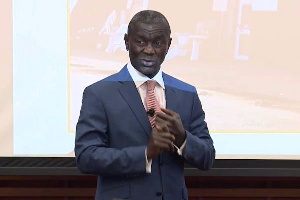General News of Tuesday, 4 August 2020
Source: www.ghanaweb.com
Flashback: Ghanaian graduates have questionable certificates - UT Bank founder
The CEO of defunct UT Holdings, Prince Kofi Amoabeng in 2017 questioned the eligibility of honors held by some Ghanaian graduates, stating that most of them including ‘beautiful ladies’ have questionable certificates.
Speaking in an interview on Accra FM, Mr. Amoabeng revealed that what he usually does is “to find a way to test” those who “apply for a job with a First Class”. He added that one cannot entirely trust graduates considering their poor performance in the corporate world.
Read the full story originally published on August 14, 2017 on GhanaWeb
Founder and CEO of UT Holdings, Kofi Amoabeng has questioned the authenticity of university graduates of this generation, insisting that holding a First Class certificate does not guarantee one’s qualification for a job.
According to him, the majority of Ghana’s graduates, especially the ‘beautiful ladies’, move into the job market with unearned certificates, making it difficult for them to thrive in the corporate world.
Speaking in an interview with Accra FM, Mr. Amoabeng said majority of Ghana’s graduates have questionable certificates and cannot be trusted to competently deliver when entrusted with positions.
He went on to state that it had become necessary “to find a way to test” whether the honors held by our graduates truly define their qualities in the job market, adding that he always suspects beautiful ladies who “apply for a job with a First Class”.
In his view “you cannot trust the people that have come out” from our universities anymore, disclosing that his companies take the pain to re-train their employees for two years in order to better equip them.
According to him those being churned out by the universities are normally “not good enough”, insisting the educational sector has a lot more to do to catch up.











